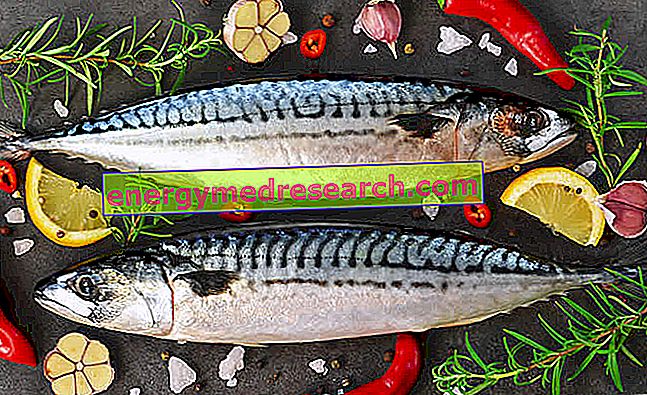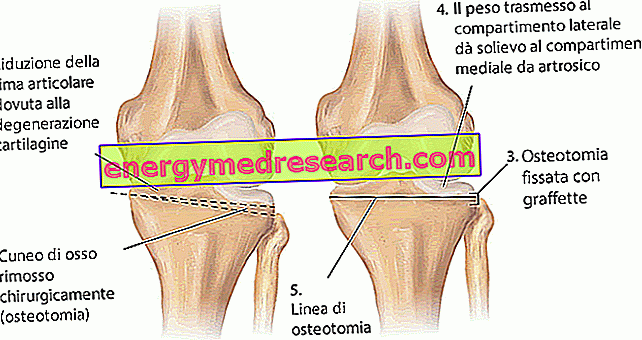Nutritional importance
Importance of fish in the Mediterranean diet
Fish, especially the "blue" one, is one of the typical products of the Mediterranean diet.
Very valuable from a nutritional point of view, it should be consumed frequently and regularly (2-3 times a week). However, at the time of purchase, consumers are sometimes disoriented due to poor skills in the choice and culinary preparation of fish; in short, "they do not know which way to turn!"

In reference to the blue fish, the most indicative species are: anchovies, sardines, needlefish, mackerel and bonito, which also belong to the whole of the "poor fish".
Wanting to further narrow the field and identify "the ideal fish", we should examine all the characteristic aspects of this food group. For obvious reasons, we jump directly to the conclusion by defining that the right compromise between the nutritional, practical and economic aspects is the mackerel.
Nutritional properties
Mackerel belongs to the fundamental group of foods and as such it provides excellent quantities of:
- High biological value proteins: commonly called "noble proteins", they are nutrients that contain all the essential amino acids in the right percentages. Those of the fish also enjoy an excellent satiating power; mackerel is therefore relevant to slimming diets.
- Bioavailable iron: it is an essential nutrient whose deficiency almost always manifests itself with anemia (a frequent disorder in fertile women). In this sense, mackerel is a valid alternative to meat and eggs
- Vitamin PP (niacin): it is a precursor of coenzymes necessary for cellular respiration
- Vitamin B12 (cobalamin): it is necessary for the maturation of red blood cells and the development of the nervous system; cooked mackerel is once again very useful in the fingers against anemia and also in the diet for pregnancy.
Furthermore, having the specific nutritional characteristics of the "blue fish", the mackerel is an important foundation for:
- Omega 3, in particular of eicosapentaenoic acid (EPA) and docosahexaenoic acid (DHA). These two nutrients, which the body is able to produce only in part, perform countless functions of primary importance, from the nervous development of the fetus and the child to the prevention of metabolic pathologies such as arterial hypertension and hypertriglyceridemia. Also for this reason the mackerel is advisable in the diet of the expectant mother; moreover, it fits perfectly in the nutritional regime against metabolic pathologies.
- Vitamin D (calciferol): it is an essential vitamin for the maintenance of the skeleton, important especially in the growth phase and in the third age (as prevention of osteoporosis). Eating mackerel is important especially in the winter months with short and not very sunny days, when the body cannot synthesize vitamin D in the skin.
- Iodine: it is a very rare mineral in nutrition and of great importance for health. Iodine allows good functioning of the thyroid and guarantees an efficient basal metabolism.
Benefits compared to other fish
Mackerel also has many other advantages compared to fishery products in general and to certain species of blue fish. Let's see some of them:
- It has an adequate average size: it is neither too small nor too large. Small sized fish (such as moles and sardines) are sometimes difficult to prepare, especially with regard to the removal of bones; natural mackerel or in oil instead, like tuna, is perfectly barbed. On the contrary, those that are too large (for example tuna and swordfish) contain greater quantities of pollutants and, even if they cannot be defined as "toxic", the larger they are, the less frequently they should be consumed.
- It is readily available, that is, it requires little effort in harvesting: it is a species that can be caught with simple systems and the nets used have large meshes, which do not present the risk of undermining fish specimens that are too young.
- It is abundant, with a vast and widespread population: in recent years, the fish population of the Mediterranean Sea has decreased significantly but some species such as mackerel have suffered less this phenomenon. This is reassuring regarding the eco-sustainability of its fishing and allows its systematic consumption for the human diet.
- Economy: we have already said that mackerel belongs to the set of "poor fish" and therefore has a limited economic impact on the family budget of the average population. Ergo, can be consumed regularly without affecting the standard of living.
Canned mackerel
A simple and practical solution to introduce blue fish into your diet
Mackerel is a typically Mediterranean food, rich in essential or necessary nutrients and has many advantages that make it more suitable for regular consumption. Now let's see how to include it in the diet.
Fortunately, mackerel is a fat blue fish! This statement, which will certainly destabilize many readers, is frankly justified by the chemical nature of the fats in question. Mackerel fat is rich in omega 3 and vitamin D, two essential nutrients that make it a "noble and precious" food.
On the other hand, we certainly can't risk getting fat. It would be useless to choose a health food that lowers the metabolic risk while promoting weight gain.
The answer is actually very simple: just adjust the condiments! The extent of this change depends above all on the potion and the overall composition of the diet, however, respecting some indications we can be sure of maintaining the nutritional balance while consuming a fish rich in "good fats" such as mackerel:
- Consume 2-3 whole portions of mackerel per week as a dinner dish. It is also possible to break them into half portions to be consumed as a snack or small second course for lunch
- When eating mackerel in the natural state it is advisable to avoid seasoning; it is a tasty fish in itself and does not require the addition of oil or salt
- When mackerel is consumed in oil (extra virgin olive oil) it is advisable to reduce the condiments of the other dishes in the same meal.
Following these tips it will finally be possible to give the much vaunted bluefish a fixed role in the diet.
Let us once again remember that mackerel, rich in omega 3 and vitamin D, is a food that can contribute significantly to the physical and cognitive development of children.
Especially the one in oil is very successful among the little ones facilitating the structuring of a balanced diet for children.



